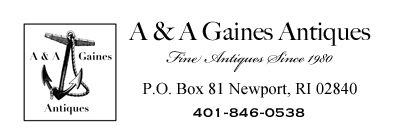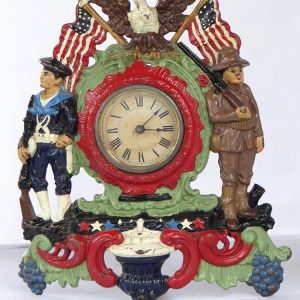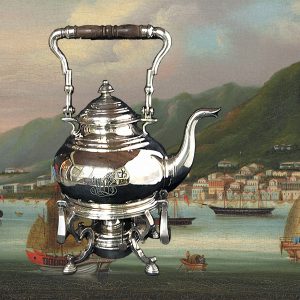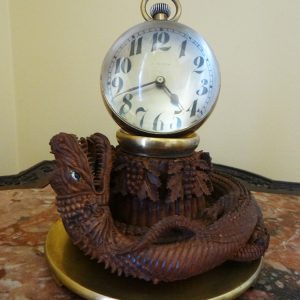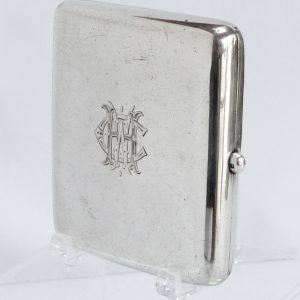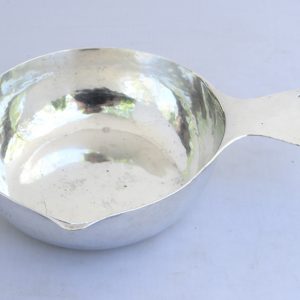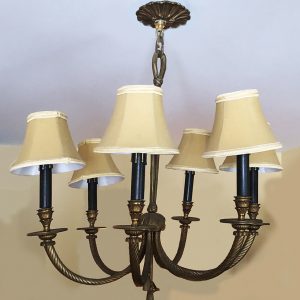












Antique Silver Spanish Colonial Charger, Historical US Provenance
An especially fine Spanish Colonial – Mexican – solid silver 17″ diameter charger of the late 18th to early 19th century. This very impressive piece was owned by Buckingham Smith, 1810 – 1871, diplomat, author, explorer, and philanthropist. The charger was bequeathed to Joanna Williams in 1872 and is so engraved on its base.
This charger is modeled on classic mid-eighteenth century designs. It is finely wrought with its upper surfaces displaying excellent quality, surface, and patina. The charger’s early fabrication and Mexican origin are evident on its undersurfaces with casting irregularities and hand workmanship very clear along with the hand tool marks and construction details inherent in classic early Spanish Colonial silver objects. The charger also bears engraved ownership markings associated with 18th and early 19th century Mexican silver objects (please see close-up picture of marks). Collectors of early Mexican / Southwest silver consider these important features. Given the physical properties of this beautiful charger we date its creation to the second half of the 18th century and possibly into the first quarter of the 19th century.
Substantial pieces of early Mexican silver such as this are quite scarce due to the region’s intermittent political instability, civil war, natural disasters, and the varying fortunes of those who could afford large silver pieces in that place and period.
This piece is also of considerable historical value its owner having been involved in 19th century diplomatic relations between the United States and Mexican Republic.
This charger bears the engraved inscription on its base, “Joanna Williams, from, Buckingham Smith, 1872”. Buckingham Smith was a prominent citizen of St. Augustine, FL, an explorer, diplomat, author, surveyor, and philanthropist. This charger was evidently bequeathed to Joanna Williams after Smith’s death in 1871.
Mexico had been a Spanish colony until its citizens revolted against Spain in 1821 and created the Republic of Mexico. Buckingham Smith’s father, Josiah Smith, was an American diplomat appointed US Consul to Mexico sometime prior to 1824, during which year Buckingham visited him at his post. Josiah Smith died in Mexico in 1825. Josiah Smith likely had interesting experiences as one of the first American diplomats in Mexico during the turbulent period of establishing the new republic. In 1851 Buckingham Smith became secretary of the US Legation in Mexico City. General Santa Anna was still president of Mexico despite being defeated in the United States / Mexican War, 1846-1848. It is quite likely Buckingham Smith had to deal with some difficult post-war diplomatic situations. In addition during the 1850s France, under the rule of Napoleon III, became involved in Mexican affairs which led to French occupation of Mexico during the American Civil War.
We have not been able to determine if this charger was first acquired by Josiah Smith in the 1820s and passed down to Buckingham, or if Buckingham acquired it in the 1850s. A substantial body of information on Buckingham Smith is available on the internet.
Below are some extracts from the wealth of information available on the internet relating to Buckingham Smith and the websites they are taken from.
As early as January 17, 1851, Letcher had reported that opposition to the treaty was “violent from almost every quarter.” The clergy, the interests connected with rival routes, prominent men of state, foreign influence, all were hostile. Only the new president, Arista, manifested a friendliness toward it, and he was accused of desiring to cede a portion of the country to the United States. During the following month, Buckingham Smith, United States chargé ad interim, reported that the people of Mexico had become no more favorably inclined toward the convention, while on April 1 he said that, according to current opinion, the treaty could in no way or shape receive the ratification of the Mexican congress. There was not a member of the cabinet who favored it, and all agreed that “the experiment with Texas should be enough.” If their neighbors were given “a foothold in Tehuantepec” they would seize one-half of the remaining territory of the republic.”29
In the early spring of 1851, the United States chargé, Smith, had been informed that the Mexican government would not allow foreign vessels to enter the ports of the isthmus “under any circumstances,” and the Mexican vice-consul at New Orleans had been directed to deny the American company all communication with the isthmus. But the company insisted on its right to proceed with the operations. Accordingly, the steamer Gold Hunter was dispatched from San Francisco for Ventosa in the state of Oaxaca. When it arrived there, April 6, the cargo and passengers, after being detained several days, were eventually forbidden a landing. In consequence, the captain declared that he had been subjected to heavy and unnecessary expenses and demanded damages from the Mexican government.
Member Florida Territorial Legislature, 1841. Secretary United States legation, Mexico City, 1850-1852, secretary legation in Spain, 1855-1858. Delegate Democratic National Convention, Baltimore, 1864.
For more information:
- http://penelope.uchicago.edu/Thayer/E/Journals/MVHR/6/4/Tehuantepec_Diplomacy*.html
- http://www.drbronsontours.com/bronsonbuckinghamsmith.html
- https://en.wikipedia.org/wiki/Buckingham_Smith
CONDITION: This beautiful piece is in excellent original condition with lovely patina and no evidence of anything other than careful hand cleaning/polishing.
A very impressive and large early Mexican silver piece such as this which is also directly associated with an important period in American and Mexican history is a considerable rarity worthy of any public or private collection.
We acquired this piece in the Boston, Mass. area in 1987. we have been its caretakers since then.
Dimensions: width across handles 17″, body diameter 14 5/8″ , body height approx. 1 3/8″, weight 1270 grams (40.83 troy oz.)
